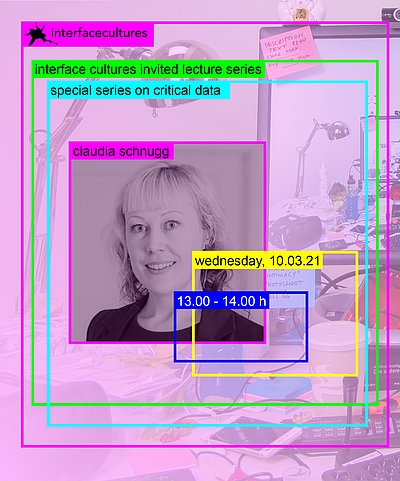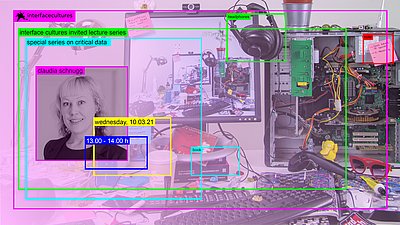ArtScience Projects in Critical Data
10. März 2021, 13.00 bis 14.00 Uhr ONLINE via Microsoft Teams
Interface Cultures Invited Lectures Series on Critical Data mit Claudia Schnug.
Meeting link: teams.microsoft.com
For connectivity problems, please contact davide.bevilacqua@ufg.at
Cutting-edge technologies including big data are infiltrating society and industrial developments, thereby affecting social, cultural, and individual processes such as meaning-making, decision-making, or understanding of privacy. This calls for investigation from all disciplinary perspectives. For example, in summer 2020, after heated arguments on the influence of Twitter on public opinions and fake news, the founder and CEO of Twitter Jack Dorsey was asked what he would do differently if he could go back in time to start his company again. In this interview with The New York Times he claimed that there were some disciplines he’d include to contribute meaningful perspectives concerning questions of dealing with data and social dynamics: game theory, behavioral economy, and social science.
Though, not only disciplines form the social sciences that need to be added to the discussions. Art and culture are crucial actors to illuminate blind spots in the field. They bring experiential qualities, explore possible implications, create context, and open up new levels of critical discussion. In this respect, the guest lecture will tackle the following questions: how can such artworks reach out to actors in industrial organizations, leading tech companies, or researchers working in the field? How can successful collaborative processes between artists and researchers in scientific or industrial organizations be designed? What are social and cultural dimensions that must be kept in mind when realizing and curating such artscience collaboration processes?
Claudia Schnugg
Dr. Claudia Schnugg is independent researcher, curator, and international consultant in artscience collaboration processes. Her work focuses on intertwining artists and art projects with new technologies and cutting-edge scientific research. She has explored effects of artistic interventions on social settings, especially framing artistic interventions and art programs in (scientific and corporate) organizations. In doing so, Claudia is developing methodologies for innovation and meaningful interaction with the arts. Her academic expertise builds on social and economic sciences as well as cultural sciences. She was assistant professor at JKU in Linz, visiting researcher at Copenhagen Business School, at Art|Sci Center + Lab, Los Angeles, and at European Southern Observatory, Chile. As Senior Curator she headed the Ars Electronica Residency Network (2014-2016) and was first Artistic Director of Science Gallery Venice (2018-2019). As independent researcher, consultant, and curator of artscience programs, Claudia is working with leading scientific institutions, universities, tech corporations and cultural partners, such as Helmholtz Center Munich, Quo Artis, Science Gallery Dublin, Unbore, ESA ESTEC, Pro Helvetia, Human Insights Lab at Accenture, and Fraunhofer Institute for Digital Medicine. Her most recent book is Creating ArtScience Collaboration (Palgrave, 2019).


